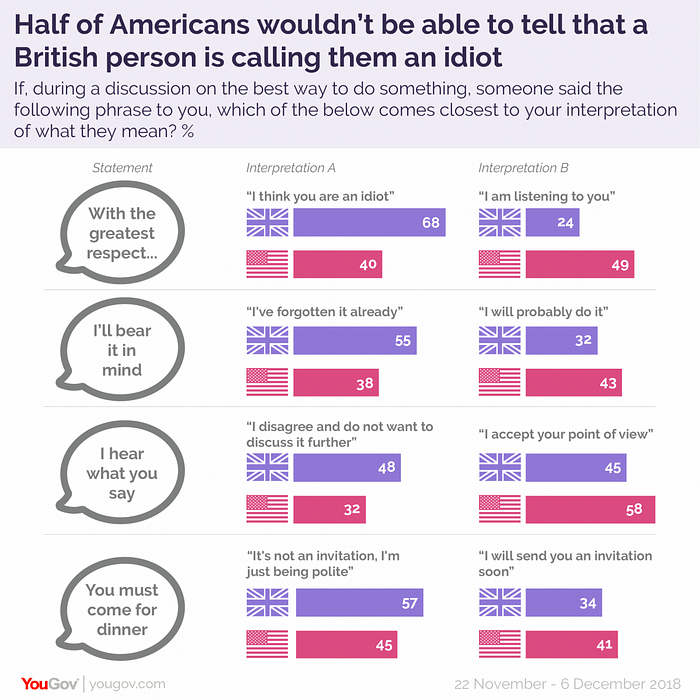British Etiquette and Social Norms: Understand British Subtext

A survey conducted by YouGov Omnibus unveils how Brits employs passive aggressiveness during conversations. It shows a high percentage of Americans fails to get British subtext correctly.
“with the greatest respect”
Half of Americans (49%) believe this is a way of saying by acclaiming their perspectives while more than two thirds of Brits (68%) assert the phrase is social code for “I think you are an idiot”.
“I hear what you say”
Americans tend to interpret the sentence as “I accept your point of view” (58%) while Brits try to allude that “I disagree and do not want to discuss it further” (48%).
Here’s another example. To most Brits (57%), the expression “you must come for dinner” is simply a greeting out of social nicety. But, 41% of Americans will take the invitation seriously.
It is customary to take a bottle of wine or a bouquet of flowers for the host when you visiting friends’ place. British value punctuality. But, 10–15 minutes later for dinner is a common way of showing politeness in the UK.
As to the table manners in the UK, do not wave your hand or call out a waiter in a restaurant.Avoid making sounds while chewing. Do not talk with food in your mouth.Do not eat soup with a fork.Do not rest your elbows on the table. Lay your knife and fork together at the clock position of 6.30 to indicate you finish your meal.
Brits are famous for over-apologizing! Brits are discreet and reserved in words. Thus, Brits are masters of understatement and sarcasms are popular communication styles for Brits to show their black humor. They have a marked tendency to use words such as ‘perhaps’ or ‘possibly.’
I would say, “with the greatest respect” is a perfect way of saying to respond to haters. I suppose Brits has a great chance to befriend with Japanese without much misunderstanding in social gatherings.
The Psychology Behind Passive-Aggressive Behavior
Generally, a passive aggressive comment or behavior is the demonstration of negative feelings or disagreement in a discreet subtle manner. Instead of blaming, Brits tend to evade conflicts by burying their anger with sarcasm or backhanded compliments. Those who prefer using passive-aggression language are probably because they refuse to acknowledge and confront their anger or negative feelings.
Etiquette and Social Norms in the UK
In the UK, tipping is the norm when it comes to dining in the restaurants. Yawning or sneezing without covering your mouth would be considered rude by most British people. Anyone who tries to jump the queue is reprehensible for most British people. Indeed, if have a valid reason, they might let you move ahead of them out of etiquette. Handshake is most common form of greeting in the UK when meeting someone for the first time at formal occasions. Hugging and kissing on the cheek is usually limited to close friends or relatives. British social norms are the unwritten rules of behavior that are considered widely acceptable in the UK.
More examples of British social norms
1. Unless the movie theater is crowded, do not sit right next to someone.Do not stand close enough to a stranger to touch arms or hips.
2.Always avoid discriminatory comments in conversations.
3.If you must burp or fart, plz say “excuse me.” If someone sneezes near you, please say “bless you.”
4.When visiting friends’ home, ask permission to use the bathroom.
5.Leave a tip for the waiter or waitress and tip should be at least 15% of the bill.
6.
7.Don’t answer a phone call during dinner time. Also, do not text while on a date.
8.Acknowledge others in the elevator with a simple nod.
9.Always thank your server.
10. Shake hands upon leaving at social or business meetings.
11 In a pub, it is norm to pay for a round of drinks for everyone in your group.
12. Do not ask personal questions such as their annual salary. Do not cut into a conversation.
Attention: In the UK , there are numerous dialects. Accents vary dramatically from south to north.First names are used in written communication on the premise that you know the person well. Additionally, it’s not common for Brits to use abbreviations in business letters.
Reference
A new YouGov survey shows many Americans wouldn’t get British subtext
British Social Attitudes | NatCen Social Research
Can Americans understand British passive-aggression?
3 popular slang words in British English: Sorted/Innit/DAB!
